- Home
- Alice Walker
The Third Life of Grange Copeland Page 12
The Third Life of Grange Copeland Read online
Page 12
“You not some kind of field hand!” he muttered sharply when she said she’d love to ride on top of the cotton all the way to town.
“But Grange, my goodness, can’t I ride as far as the bridge?” she asked the first time. He seemed too annoyed at the thought to answer her. She began to get the feeling she was very special. At school she avoided the children whose parents let them ride on the back of trucks—“Grinning niggers for the white folks to laugh at!” she scoffed. And the children in turn quickly learned what hurt her most. They called her “Miss Stuck-up” and when that produced no effect, “Mrs. Grange.”
The time she did manage to spend atop the truck was supremely happy. From that high perch she could see, it seemed to her, miles and miles across fields and forests and on into the sky. A sky which was benign and cloudless in those days. More often than not she and Grange left Josie at home. Ruth rarely thought about Brownfield; when she did, Grange was quick to assure her that Georgia jails were among the best.
Grange also raised vegetables in his garden in front of the house. You could sit on the front porch and watch the tomatoes grow. He would cut big coarse cabbages at the stem with a flat dull knife and balance one like a crown on her head. He raised carrots and tomatoes and peas, and in fall, after the peas had dried in the sun, they sat up late at night gossiping and shelling them. Josie, who hated all kinds of work, farm or otherwise, would get up reluctantly from telling long tales about the “olden days” or her younger days and wash fruit jars so that in the morning Grange could help her can, “put up” the peas.
It was at times of such domesticity that Ruth felt keenly Josie’s objection to her and mourned the loss of her mother. Memories that might have been tossed aside by a child more innocently brought into a new home with new sources of play, came rushing back at odd moments of wakefulness, more usually in dreams. The long fall days, languid and slow and heavy, of gathering in, and then of putting up, brought to mind the good memories she had of her mother, when they had seemed to prosper in the hot summers, canning and making potato hills, and winter held no fear for them.
Other grownups she saw never mentioned her parents. They acted as if they did not, or had not, existed. Josie was a clam when she was asked a simple question about them, or asked simply to remember. But Grange was drawn to discuss them. He said they should not be forgotten, especially Mem, who was a saint. He liked to use some reference to Mem’s thriftiness or her hard-working goodness as a beginning to a list of comparisons he made between her and Josie. He would be carried away by his vivid recollections of Mem and reproach his wife viciously because she was not the kind of woman his son’s wife had been. Josie would begin to cry, or pretend to suffer.
“You lazy yaller heifer!” he would start out, “and don’t you come saying nothing defending to me. You no-good slanderous trollop, you near-white strumpet out of tallment, you motherless child, you pig, you bloated and painted cow! Look to your flopping udders hanging out in mass offense! You lustful she-goat! Close up your spreaded knees before this innocent child and my gray head!” But he became unsure of himself when she began to cry. “Shit,” he would mutter, finally. “What you standing over there with your damn mouth hanging open for anyway. Come here and set on my goddam knee when I’m talking to you!” At first such scenes of forgiveness were frequent and at times they were very happy. Josie would come placidly over to him, chewing her gum, wetting her purple lipstick with her sly little tongue, her tears vanished. And Grange would mumble from deep in her dress front, “Ah, me oh my, here I is. Lost again.”
Ruth did not always sleep with them. Grange was gentle but firm.
“It ain’t healthy for a heap of peoples to sleep in the same bed, don’t you know. Anyways, it all right for just two. If they be grown.”
Shut away from them, turning restlessly on her bed, Ruth tried to fathom the mystery of her grandfather’s contempt for and inevitable capitulation to Josie. When she could not fall asleep Mem came back to confront her; Mem, whose hands were callused and warm, whose lips were chapped and soft, and whose eyes were restored to their look of tough, gentle sadness and pain.
33
GRADUALLY, SULKILY, JOSIE faded into the background, and Ruth and her grandfather became inseparable. They did not plan it this way; but always they were together; where Grange went, Ruth went, what he did, Ruth did. Josie, having sold her lounge to help Grange pay for the farm, had no place to go and none of her old friends came to see her. Ruth and Grange halfheartedly tried to interest her in their pursuits, but the farm held no attractions for Josie; she thought of herself as a city woman. She brushed them off, and they were happy to be brushed off. They left her muttering and pacing the floor, filing her purple nails.
In the wintertime, a few days before each Christmas Eve, Grange began his preparations for making ambrosia. He was an uneducated man, but he still remembered that somebody, some old white lady’s daughter no doubt, had once told him that ambrosia was what all the gods used to eat before there just came to be one God, which they had now, that never did eat anything. “That’s ’cause He done got stocked up while He was creating Hisself,” was Grange’s short explanation.
To make ambrosia you needed fresh, hand-shredded coconut and pineapples and oranges. Probably something else went in, a shot of whiskey or wine, but Ruth remembered mostly the oranges and coconuts. Grange’s sister, who lived in Florida, would send these in one large and one small crate, along with so many grapefruits the whole house looked like a fruit stand. Grange liked to put out every piece of fruit on a “high place,” like the mantel or the tops of dressers and chifforobes, and when children came to visit—and they were allowed to come only at Christmas—he had a generous way of reaching behind him or over his head and producing a bright orange or grapefruit. Then he would grin at the small bewildered visitor and say, as if he had forgotten the words at the beginning, “Hocus-pocus on you, boy!”
The next thing you needed to make ambrosia was a big churn. Grange had two, one milk-white with a lovely faded drawing of a blue bull near the top, and a brown earthen one. They had belonged to Josie’s mother, and Grange said that she had liked to use the white one during the week and the brown one on Sunday. In remembrance of her—her wide-eyed picture was among those in the front room—they used the brown churn for the Christmas ambrosia.
Grange and Ruth and Josie would sit around peeling oranges and shredding coconut until two o’clock in the morning. Of course, the whole business could have been finished in an hour, but Grange would stop ten or fifteen times during the process to tell a story, or the truth about something or somebody. He knew all the Uncle Remus stories by heart, although he could make up better ones about a smart plantation man named John. John became Ruth’s hero because he could talk himself out of any situation and reminded her of Grange.
Grange thought that Uncle Remus was a fool, because if he was so smart that he could make animals smart too, then why the hell, asked Grange, didn’t he dump the little white boy (or tie him up and hold him for ransom) and go to Congress and see what he could do about smartening up the country, which, in Grange’s view, was passing dumb. “Instead of making the white folks let go of the stuff that’s rightfully ours, he setting around on his big flat black ass explaining to some stupid white feller how too much butter in the diet make you run off at the be-hind! We needs us a goddam statesman and all he can do is act like some old shag-assed minstrel!”
He would reminisce about his boyhood, which was filled with all sorts of encounters with dead folks and spirits and occasionally the Holy Ghost, which he said was the same thing as a sort of chill, and which, if you didn’t watch out, could turn into the soul’s pneumonia.
He told stories about two-heads and conjurers; strange men and women more sensitive than the average spook. He said they could give you something to wear under your hat that’d make your wife come back (if she ran away), or make her run away if you were sick of her. He told about how one old juju man who, people
claimed, could turn into a bat, had actually cured him of a bad case of piles by giving him a little bag of powder to dust down in the stool. “What’s piles?” Ruth asked. “A serious grown-up disease,” he answered.
He said there was a two-headed lady in town named Sister Madelaine. She had changed herself from a white colored woman to a gypsy fortuneteller. “Why she do that?” asked Ruth. “‘Cause she didn’t want to be nodody’s cook,” said Grange. She was a powerful woman, according to Grange, but not as good as the two-heads he had known when he was a boy. Two-heading was dying out, he lamented. “Folks what can look at things in more than one way is done got rare.”
Ruth’s favorite story was about how he came to join the church.
It happened one spring when he was seven or eight years old. And it was during a revival. He had already begun getting into fights with the white children who lived down the road, usually “beating the stuffing out of them” to let him tell it. His mother, a pious and diligent house servant for most of her life, never seriously attempted to make him stop fighting (she would say gently that she didn’t want to break his spirit), but instead urged him more and more toward the “bosom” of the church. Grange could never say bosom without looking down the front of Josie’s dress. Anyway, he had resisted with everything in him, for he hated revivals, hated church, and most of all hated preachers. His mother, gently persuasive and getting nowhere with him, was trying to convince him to join the church one night when her brother, Grange’s Uncle Buster, came to visit. He was built like a keg around the chest, and mean. Grange didn’t like him because he had seen him knock his wife, Grange’s aunt, through a plate-glass window. Hearing his sister’s mild, obviously ineffectual pleadings, the uncle grabbed Grange roughly by the shoulder and gave him a long lecture on receiving the Holy Ghost, and about how good it was to be saved and how if he would just open up his heart the “pue” light would just come aflying and aflooding in. In short, he said that if Grange didn’t get religion that same night he would get a horsewhipping when he got home.
Grange punctuated his tales with mirthful explosive laughs, which startled them, though they were expected. He was very good at these stories and liked to watch their eyes fasten on him, lit to glowing points of light from the crackling fire, which from time to time he spat into with unusual delicacy and accuracy. Ruth even liked the spitting, the pursing of the slick, finely molded dark brown lips against, for a minute, the clean white of his teeth, then the stinging buzz of the irons in the fire as they were hit, the momentary halting of the fire, the sound of steam rising quickly, and the sputtering consummation of the spit by the flames, for which they all waited, staring into the fire without letting out their breaths.
Grange had been placed harshly, or as he put it, “sheved down,” on the mourner’s bench. All around him the revival spirit was evident. In the first place, around the “brothers”—every one of them saved—there hung the heady aroma of spirits; mostly corn liquor or home-made wine. At the beginning of the service all these brothers were sitting as stiff as ramrods, and that evening all of them, in order to keep from falling off their benches, fastened their eyes on Grange, who was sitting dejectedly on the hard wooden bench. His Uncle Buster was one of them, and Grange fancied he could smell his breath of peach-peel brandy clear across the church.
The sisters were all got up in their best. “They wore these long-tailed dresses then,” said Grange. “In them days you could break your neck trying to see a little leg.” They wore lots of red and yellow and green, and their hair was straightened to a “fare-thee-well.” Grange grinned. “If a lizard had fell on one of them heads he was bound to slip off and break a claw!” Before the preacher started to preach they sat around gossiping like so many peacocks. “Lawd, how you, Sister So-an’-so! Chile, you shore does look good enough to eat!” Or, “You hush your mouth, girl, you ain’t got no ’leven chilren. You looks jest like a sprang chicken!” They’d be spitting out of windows and into the stove, each one trying to show some ankle under her dress tail. But as soon as the preacher got up in the pulpit they started right in with “O Sinner!” which they did mournful things to, all the while looking at Grange and looking sad.
At the end of the sermon the preacher started calling for converts. (“Calling for what, convicts?” quizzed Ruth. “Same thing,” Grange said, without stopping his story.) Two or three formerly unsaved and happy teenagers filed up front with their heads bowed. They’d probably stole something the night before, Grange said. The church began to rock with song, the sisters were shouting and the preacher stood in the pulpit dripping with sweat. Every once in a while he swiped at the top of his bald head with his handkerchief. The same handkerchief, Grange had noticed, that he was spitting into all during the service. He could feel his mother looking piteously at him, for he knew she wanted him safely enchurched more than she wanted anything in the world. He wanted to get the Holy Ghost too, for he was deathly afraid of the whipping Uncle Buster had promised him.
Looking at his mother, he thought about his uncle, and looked over in the amen corner for him. He was still there, but while the church throbbed with life and the spirit of the Lord had everybody else almost climbing the walls, Uncle Buster was fast asleep. Well! There he snored, with a long sliver of saliva collecting on his vest pocket. Grange looked, enthralled; for intently digging around in the trash that had collected around Uncle Buster’s mouth was a huge fat housefly. The kerosene lights made the fly’s wings shine like amber gems. His busy activity around Uncle Buster’s mouth was like that of a housewife sweeping out a corner, or of a greedy little boy eating stolen pie. It was then that Grange made his bargain with the God of the AME church.
Watching Uncle Buster’s wide-open mouth, around which the big fly played, he said to himself that if the fly got inside Uncle Buster’s mouth, and if Uncle Bister swallowed it, he would jump right up, claim he had found the Holy Ghost and join the church. He had decided the Holy Ghost was never coming on its own. As soon as he had done this, said Grange, the fly very cautiously sneaked into Uncle Buster’s mouth, and Uncle Buster, waking to find everybody in the church gazing in his direction, or so it must have seemed to him, snapped together his ponderous whiskered jaws, and in a pious self-righteous gulp, downed the fly! He immediately began to heave and turn a sickly color; and when Grange, at that moment, rose and started up to shake the preacher’s hand, Uncle Buster passed him with one hand clapped most firmly over his mouth. Grange said his mother had cried and shouted and was in general happy from then on.
And that was how come, Grange said, he was a member of the church but did not believe in God. For how could any God with self-respect, he wanted to know, bargain with a boy of seven or eight, who proposed such a nasty deal and meal.
During the latter part of the story Ruth bounced in her chair with laughter. And when she and Grange sat in church together they quite often giggled like silly girls over their own conventional absurdities, one of which was going to church. To preachers and church-going dandies alike, they were the dreaded incarnation of blasphemy. But it was funny, what they witnessed every Sunday—the placid, Christ-deferential self-righteousness of men who tortured their children and on Saturday nights beat their wives.
34
JOSIE SAW THEM dancing together once, in the small log cabin Grange had built Ruth as a playhouse. It was on Ruth’s tenth birthday and she was dressed from head to toe in brand-new clothes. Josie was furious. Grange had not bought clothes for her since they’d been married. And he had never, after Ruth came to stay with them, taken the trouble to dance with her.
“It ain’t decent!” she cried, while Grange and Ruth danced breathlessly all around her. “And with your heart already full of holes!” They continued to dance, the music coming bluesy and hoarse from Grange’s straining throat. When he sang he seemed to be in pain. But Ruth knew nothing of the physical condition of his heart. She knew she was in it, and that seemed enough.
“What’s she talking about you
r heart?” she asked. But Grange was caught up in his lament. Ruth thought her grandfather a very sexy sort of old guy. He was tall and lean and had a jutting hip. When he danced you couldn’t tell if his day had been bad or good. He closed his eyes and grunted music. His songs were always his own; she never heard them sung over the radio. His songs moved her; watching him dance made her feel kin to something very old. Grange danced like he walked, with a sort of spring in his knees. When he was drinking his dance paced a thin line between hilarity and vulgarity. He had a good time. His heart, to Ruth, was not an organ in his body, it was the tremor in his voice when he sang. They danced best when they danced alone. And dancing taught Ruth she had a body. And she could see that her grandfather had one too and she could respect what he was able to do with it. Grange taught her untaught history through his dance; she glimpsed a homeland she had never known and felt the pattering of the drums. Dancing was a warm electricity that stretched, connecting them with other dancers moving across the seas. Through her grandfather’s old and beautifully supple limbs she learned how marvelous was the grace with which she moved.
Josie began to leave them every Sunday. She went into town to visit the jail where Brownfield was kept. Grange did nothing to detain her, or if he did Ruth knew nothing of it. Ruth, however, was startled by this turn in events. She could not imagine anyone being fearless enough to see her father. Josie had brought them word that Brownfield had changed since he was in prison, and that they would hardly believe it was him when they saw him. Ruth had assumed she would never see him again; she had even hoped he would be done away with. Josie made her afraid that her father would be out of prison very soon. However, as week followed week and Josie’s visits became less extraordinary to her, Ruth began to relax and to enjoy her grandfather, who, now that Josie spent her time cooking chickens and baking pies for Brownfield, was all her own.

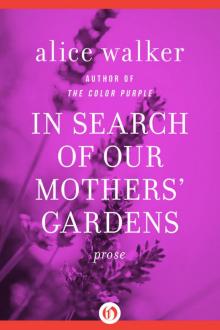 In Search of Our Mothers' Gardens: Prose
In Search of Our Mothers' Gardens: Prose In Love and Trouble: Stories of Black Women: Stories of Black Women
In Love and Trouble: Stories of Black Women: Stories of Black Women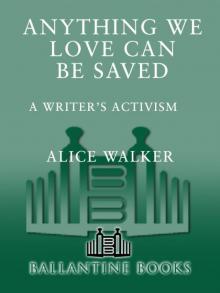 Anything We Love Can Be Saved
Anything We Love Can Be Saved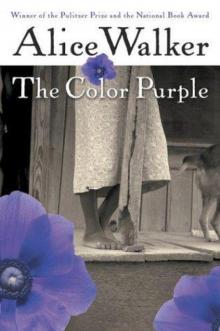 The Color Purple
The Color Purple By the Light of My Father's Smile
By the Light of My Father's Smile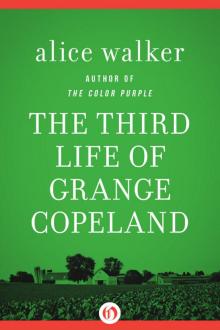 The Third Life of Grange Copeland
The Third Life of Grange Copeland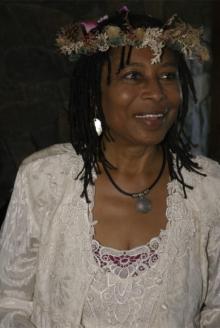 You Can't Keep a Good Woman Down
You Can't Keep a Good Woman Down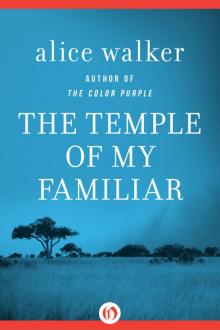 The Temple of My Familiar
The Temple of My Familiar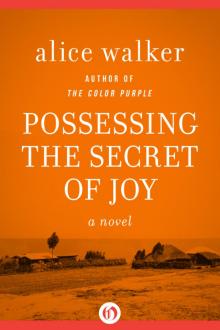 Possessing the Secret of Joy
Possessing the Secret of Joy We Are the Ones We Have Been Waiting For
We Are the Ones We Have Been Waiting For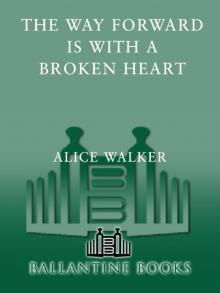 The Way Forward Is With a Broken Heart
The Way Forward Is With a Broken Heart Meridian
Meridian Revolutionary Petunias
Revolutionary Petunias A Poem Traveled Down My Arm
A Poem Traveled Down My Arm Once
Once Horses Make a Landscape Look More Beautiful
Horses Make a Landscape Look More Beautiful Living by the Word
Living by the Word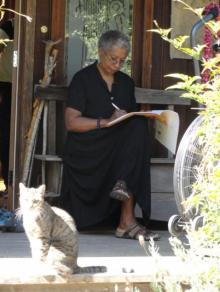 In Love and Trouble
In Love and Trouble The Color Purple Collection
The Color Purple Collection Now Is the Time to Open Your Heart
Now Is the Time to Open Your Heart Color Purple Collection
Color Purple Collection Taking the Arrow Out of the Heart
Taking the Arrow Out of the Heart The World Will Follow Joy
The World Will Follow Joy Meridian (1976)
Meridian (1976) Absolute Trust in the Goodness of the Earth
Absolute Trust in the Goodness of the Earth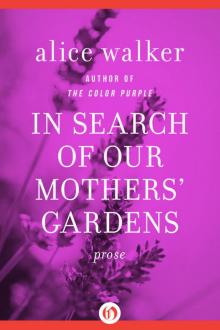 In Search of Our Mothers' Gardens
In Search of Our Mothers' Gardens